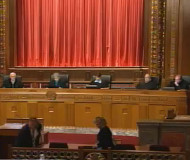1/11/2017
Ohio Supreme Court Hears Speed Camera ArgumentsHighest court in Ohio hears oral arguments in case that will decide whether the General Assembly can limit the use of speed cameras.

The legality of automated ticketing is once again before the Ohio Supreme Court. Justices who have previously upheld the authority of localities to set up courts of their own to convict motorists (view case) and to set up photo ticketing programs without legislative authority (view case) on Tuesday heard a new question: Does the General Assembly have any authority at all to rein in local governments' use of cameras?
"The central issue in this case is whether the state's traffic camera act's restrictions on photo enforcement are general laws that take precedence over Dayton's photo enforcement program," Dayton attorney John C. Musto explained.
Under the high court's interpretation of the home rule powers of municipalities, legislative restrictions must be considered "general laws" to be valid. In 2014, state lawmakers enacted a law that they claimed "banned" speed cameras (view bill). The measure, however, did nothing so grand. Instead, it put in place a minor restriction that would force localities to equip police officers with handheld speed camera guns if they wanted private companies to mail the speeding tickets to passing motorists. Many small towns now collect just as much citation revenue as before under the law, but Akron, Dayton, East Cleveland, Springfield and Toledo did not want to see even token restrictions remaining on the books.
Lower courts split on the question, with some siding with state lawmakers (view case) and others preferring to let municipalities do what they want (view case). Defenders of Ohio's restriction on speed cameras faced an uphill battle on Tuesday as Chief Justice Maureen O'Connor dominated the discussion, cutting off the other side on several occasions. She insisted that data prove their value and called it "troubling" that the state law in question required police officers to be involved.
"Their only duty is to babysit the camera," Justice O'Connor said. "And that's okay?"
Ohio Solicitor Eric E. Murphy responded that the General Assembly carefully considered all sides of the issue and came up with a legitimate compromise that applies statewide, just as the state regulations governing all traffic control devices limit the ability of municipalities to do things such as install stop signs that are blue instead of red. Only Justice William M. O'Neill displayed any sympathy for the legislature's point of view.
"We have a general law which is a whole chapter of the revised code, 4511, which says what you can and cannot do with your motor vehicle," Justice O'Neill said. "But doesn't this law also tell police officers how to do their job? Rather than being a general law, this law is saying, 'Oh, by the way, if you have a camera, you must have a live, breathing human being watching the camera do its job.'"
Justice Terrence O'Donnell recused himself from the case without explanation.


